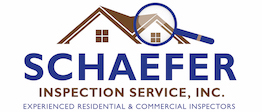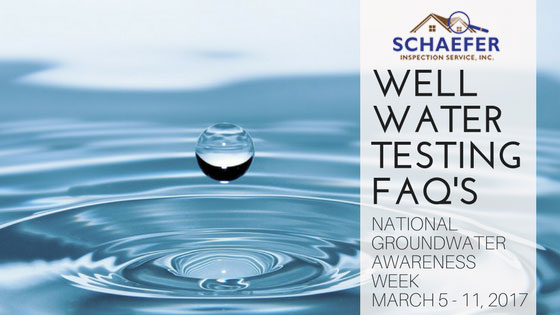Well Water Testing FAQ’s
Whether you’re washing dishes with it, taking a shower with it, cooking dinner with it, or making coffee with it, we all need clean water for a myriad of daily activities. How can you be sure your source is untainted, especially when your home is serviced by a well, rather than a municipal water supply? Through a simple and inexpensive well water test.
Here are the most frequently asked questions our inspectors are asked to help ensure you’re only drinking and using safe, healthy H2O.
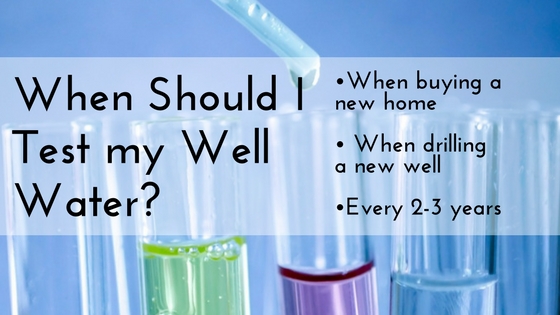
Q: When should I test my well water?
A: We recommend testing your well water when you are purchasing a new home and when you are drilling a new well, at the minimum. At Schaefer, our inspectors recommend that you regularly test your water every two to three years.
Q: What do I need to test for?
A: Our inspectors recommend that you test for six things— 1) Potability, 2) Lead, 3) Radon, 4) Arsenic, 5) Uranium, and 6) Volatile Organic Compounds (VOC’s, however, whether or not you need to test for VOC’s depends on where you live.)
Q: What does potability mean?
A: Potability tells you whether or not your water is suitable for drinking. If your home has a well, this is the minimum test you need to perform and provides general information on the overall water quality. The potability test will check for the presence of bacteria, such as E.coli and coliform. The potability test will also determine if common chemicals, such as sodium, iron, chloride, sulfate, manganese, copper, and Nitrate-Nitrogen are present in excessive amounts.
Q: How does lead end up in my water?
A: Lead in water comes from two main sources: pipes or soldering within your home or it can occur naturally from the water source. Many government home loans require you to test for lead if the home was built before 1978.
Q: How dangerous is lead?
A: Elevated levels of lead in water can cause brain, kidney and nervous system damage. Lead toxicity poisoning in infants and young children can impact mental and physical development.
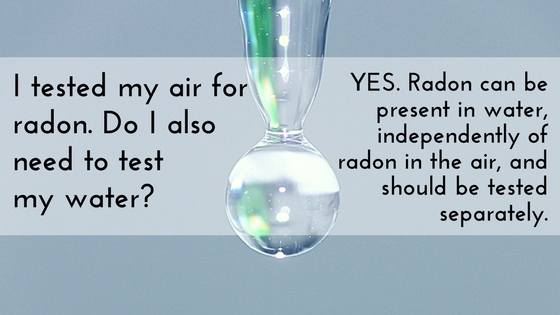
Q: My air tested negative for radon. Do I still need to test my water for radon?
A: Radon can be present in water, independently of radon in the air, and should be tested separately. If you already did a radon test and elevated levels were found, it is highly recommended to test water levels. Radon poisoning is the leading cause of lung cancer for non-smokers, and the second leading cause for smokers.
Q: Is arsenic still really a concern nowadays?
A: Yes! Arsenic and uranium occur naturally in bedrock and most deep wells are susceptible to contamination from arsenic and uranium. In general, arsenic is dangerous when directly ingested, like in your drinking water, for instance. Here in Connecticut, elevated levels of the chemical have been found sporadically.
Q: Why are arsenic and uranium dangerous?
A: Arsenic is a carcinogen linked directly to bladder, lung, and skin cancers. It can also cause problems with cardiovascular, immune and neurological systems. Uranium, in its natural form, can cause decay in the kidneys.
Q: You said earlier that VOC’s are only a danger in certain areas. Which areas?
A: Homes built in neighborhoods near industrial businesses and warehouses are at the greatest risk. Chemicals and other solvents spilled on the ground can leech into source water and contain elements such as carbon, hydrogen, oxygen, fluorine, chlorine, bromine, sulfur, and nitrogen.
Q: How can I protect myself from contamination and make sure I’m drinking clean, chemical-free water?
A: Call Schaefer to test the quality of your well water! A quick, inexpensive well water test will give you peace of mind. And in observance of National Groundwater Awareness Week (March 5-11), Schaefer is offering $25 off a water testing package. Click here to claim your offer!
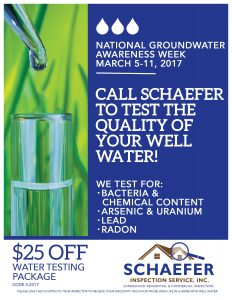
If you have any other questions water testing or home inspections or would like to schedule an appointment for either, give us a call at 1-800-345-2776. You can also reach out to us on our Facebook page here or tweet us @SchaeferInspect.
